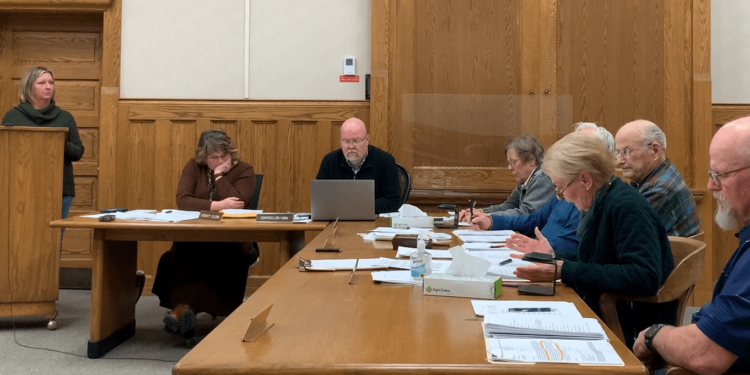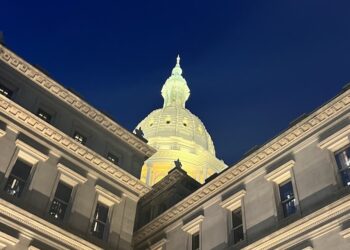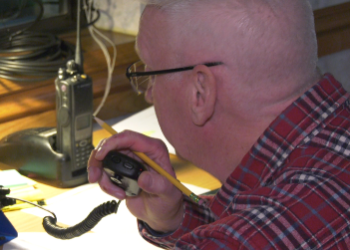IRON MOUNTAIN, Mich. (WZMQ) – In a packed Dickinson County Commission meeting, crucial topics unfolded as the Bay College President, Dr. Hughes, proposed a millage increase for Bay College West. The proposal aimed to boost the county’s contribution to the Iron Mountain campus from approximately $900,000 to $1.2 million to be voted on by the public in 2025.
Dr. Hughes explained, “We’re moving towards a business banking model, identifying campuses by city names”. Dr. Hughes acknowledges Dickinson County’s desire to have representation on Bay College’s board of trustees, and it is still being discussed with the board’s attorney whether the representative will be a voting member or just a liaison. “I have heard loud and clear from my constituents that they would prefer to have a voting member,” Dr. Hughes added.
Commissioner Stevens noted, “Now you’re going to get a few more dollars from us soon, from somewhere around $900,000 to around $1.2 million annually,” referencing the millage.
Meanwhile, Commissioner Kramer raised concerns about Northpointe Behavioral Health’s finances, compliance with state laws, and the distribution of employee bonuses, and mentioned the county’s attorney considers the term “bonuses” problematic for the money being discussed. The commissioners delved into statutes, demanding audits for 2020, 2021, and 2022.
“Has Northpointe followed the procedures and submitted its needs assessment annual Plan and request for funds as required by law to each of the county boards who created the authority, that’s my question.”
“We as a board have not seen any Northpointe request for funds to include appropriation for a fiscal year. Our budget is going to be finalized this year, is your fiscal year ending September 30?”
[Northpointe CEO] Cescolini: Yes
“OK, so you would’ve had time to provide an annual report to us and a budget request in a public hearing between your end of your fiscal year and the start of ours.”
“OK, I also read that you can’t carry forward more than 5% of state revenue over state expenditures. Up to 5% is all that’s allowable. So there’s been concerns over the significant uncovered overages in the Northpointe budget, and how that money was dispersed in retention bonuses to all its employees”
“Estimates range anywhere from 800,000 to 1.4 million. It was taken from the Northpointe Board minutes. Was a legitimate wage study completed? Have Northpointe employees already received their bonuses? Did each of the employees receive the same amount? And if not, please explain the formula used, and why the top-tier employees receive more. Please provide the disbursement formula, and if you will, the W-2s and 1099’s for all administrative medical and contract staff for us to review.”
“I have one more question, What do you do with the $99,000 from our county?”
Northpointe CEO Cescolini responded, “I’d like to have your questions and responses presented publicly, so everyone can hear the answers.”
An Iron County board member, Mark Stauber (board chair) also attended, interested in the questions being presented to Northpointe, interested in knowing more about proposed cutbacks with Northpointe, and suggested further discussion toward a resolution among all parties involved.
Senator Ed McBroom, in a legislative report, addressed his Open Meetings Act proposals, aiming to refine virtual participation rules for different public bodies.
He expressed concerns about the lack of clear rules regarding virtual participation in board meetings before the COVID-19 pandemic. Observing instances of members being called in just for votes, and not engaging in discussions, he witnessed problematic behaviors during virtual presentations at various public body meetings – including CMH (community mental health) board meetings – where concerns were not addressed by a chairperson.
While acknowledging the necessity of virtual meetings during the pandemic, he emphasized that the legislature’s reaction led to a complete restriction on virtual participation and voting, causing challenges for volunteer boards. Senator McBroom aims to address these issues and explore ways to establish more nuanced rules for different public bodies.
He also discussed challenges faced by power companies in achieving zero carbon emissions by 2040, highlighting the difficulty of balancing local control and environmental goals.
Commissioner Stevens sought Senator McBroom’s help with the veteran cemetery and expressed disappointment over Pine Mountain’s failure to secure state funding for ski jump improvements.
Senator McBroom expressed frustration, “I’m not trying to cast any stones here, because my party is not always lily-white ‘does the right thing all the time’ any more than the other side is, so I’ll just preface that by saying this year was in 11 years of my service in the legislature, the least amount of money we were ever able to bring home for the Upper Peninsula. We got about $15 million here for special projects. 7 and 1/2 of that was for the Newberry hospital. So, it wasn’t a great year for us to be able to help a lot of the Upper Peninsula projects, and I hope that we can do better in the future. This is particularly frustrating in light of the fact that we have the biggest budget we’ve ever had, and we had $9 billion of surplus to spend.”
He also discussed looking into special funding to finish work on Leeman Rd.
He introduced legislation changing the way University boards are elected in the state, mentioning that the University of Michigan, Michigan State, and Wayne State are our only currently elected universities, with those elections not proving very productive. The governor has signaled support for these changes.
Senator McBroom discussed the state’s recent ‘zero carbon emissions by 2040 legislation’, which will result in a cost increase of around 10 percent for the Upper Peninsula, and result in the closures of natural gas plants in Negaunee and Baraga…
“That’s really probably the biggest kicker for us in the UP… These [recently installed] plants, we’re all paying for them right now, we won’t be done paying for them until 2049. And if we shut them down, we still have to pay for them.”
The Bay College millage proposal is expected to go on the ballot sometime in 2025, adding another layer to the county’s complex financial considerations.
The next county commission meeting is moved to the Tuesday following Christmas.









